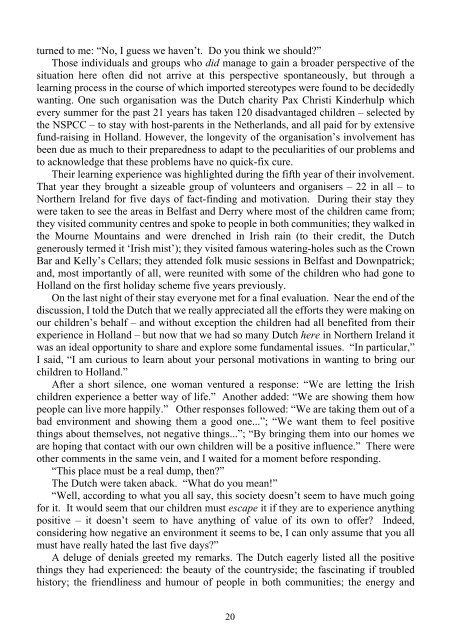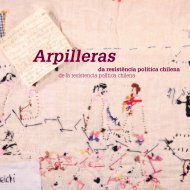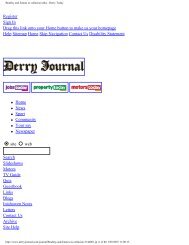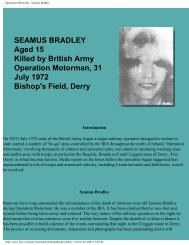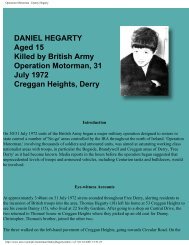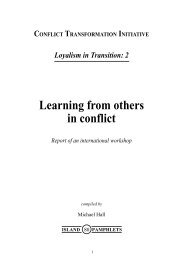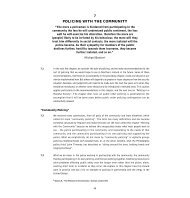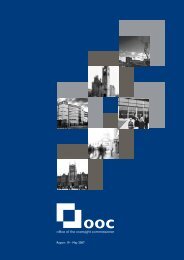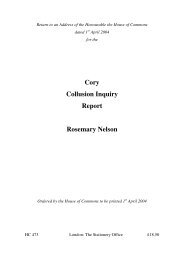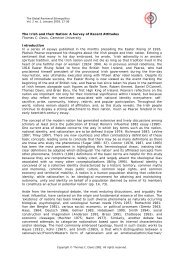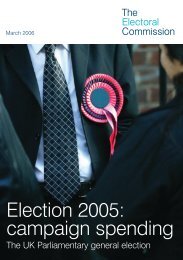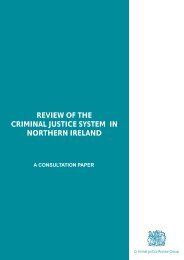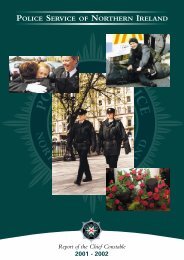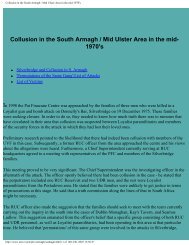(14) Reinforcing Powerlessness - CAIN - University of Ulster
(14) Reinforcing Powerlessness - CAIN - University of Ulster
(14) Reinforcing Powerlessness - CAIN - University of Ulster
Create successful ePaper yourself
Turn your PDF publications into a flip-book with our unique Google optimized e-Paper software.
turned to me: “No, I guess we haven’t. Do you think we should?”Those individuals and groups who did manage to gain a broader perspective <strong>of</strong> thesituation here <strong>of</strong>ten did not arrive at this perspective spontaneously, but through alearning process in the course <strong>of</strong> which imported stereotypes were found to be decidedlywanting. One such organisation was the Dutch charity Pax Christi Kinderhulp whichevery summer for the past 21 years has taken 120 disadvantaged children – selected bythe NSPCC – to stay with host-parents in the Netherlands, and all paid for by extensivefund-raising in Holland. However, the longevity <strong>of</strong> the organisation’s involvement hasbeen due as much to their preparedness to adapt to the peculiarities <strong>of</strong> our problems andto acknowledge that these problems have no quick-fix cure.Their learning experience was highlighted during the fifth year <strong>of</strong> their involvement.That year they brought a sizeable group <strong>of</strong> volunteers and organisers – 22 in all – toNorthern Ireland for five days <strong>of</strong> fact-finding and motivation. During their stay theywere taken to see the areas in Belfast and Derry where most <strong>of</strong> the children came from;they visited community centres and spoke to people in both communities; they walked inthe Mourne Mountains and were drenched in Irish rain (to their credit, the Dutchgenerously termed it ‘Irish mist’); they visited famous watering-holes such as the CrownBar and Kelly’s Cellars; they attended folk music sessions in Belfast and Downpatrick;and, most importantly <strong>of</strong> all, were reunited with some <strong>of</strong> the children who had gone toHolland on the first holiday scheme five years previously.On the last night <strong>of</strong> their stay everyone met for a final evaluation. Near the end <strong>of</strong> thediscussion, I told the Dutch that we really appreciated all the efforts they were making onour children’s behalf – and without exception the children had all benefited from theirexperience in Holland – but now that we had so many Dutch here in Northern Ireland itwas an ideal opportunity to share and explore some fundamental issues. “In particular,”I said, “I am curious to learn about your personal motivations in wanting to bring ourchildren to Holland.”After a short silence, one woman ventured a response: “We are letting the Irishchildren experience a better way <strong>of</strong> life.” Another added: “We are showing them howpeople can live more happily.” Other responses followed: “We are taking them out <strong>of</strong> abad environment and showing them a good one...”; “We want them to feel positivethings about themselves, not negative things...”; “By bringing them into our homes weare hoping that contact with our own children will be a positive influence.” There wereother comments in the same vein, and I waited for a moment before responding.“This place must be a real dump, then?”The Dutch were taken aback. “What do you mean!”“Well, according to what you all say, this society doesn’t seem to have much goingfor it. It would seem that our children must escape it if they are to experience anythingpositive – it doesn’t seem to have anything <strong>of</strong> value <strong>of</strong> its own to <strong>of</strong>fer? Indeed,considering how negative an environment it seems to be, I can only assume that you allmust have really hated the last five days?”A deluge <strong>of</strong> denials greeted my remarks. The Dutch eagerly listed all the positivethings they had experienced: the beauty <strong>of</strong> the countryside; the fascinating if troubledhistory; the friendliness and humour <strong>of</strong> people in both communities; the energy and20


